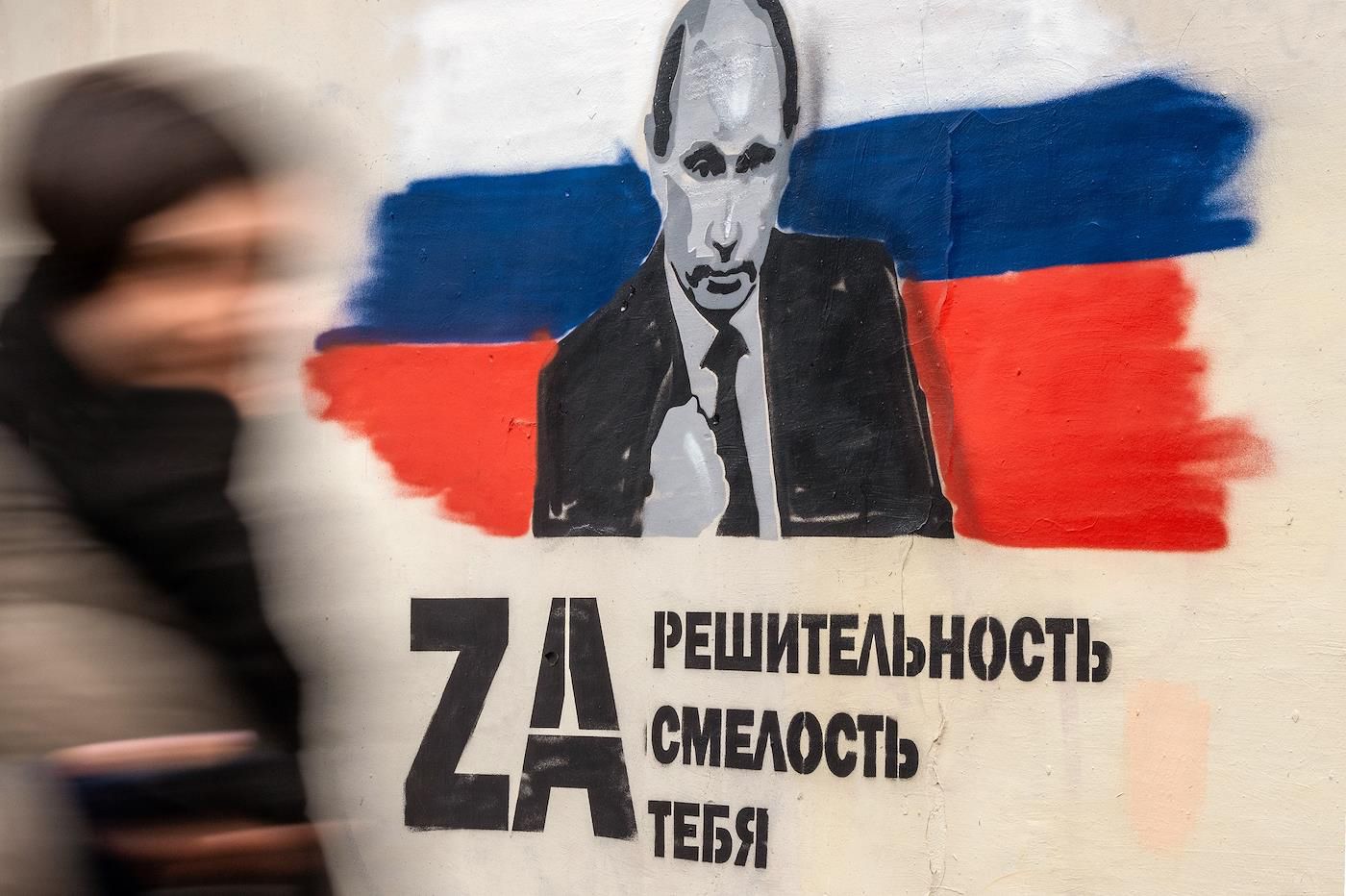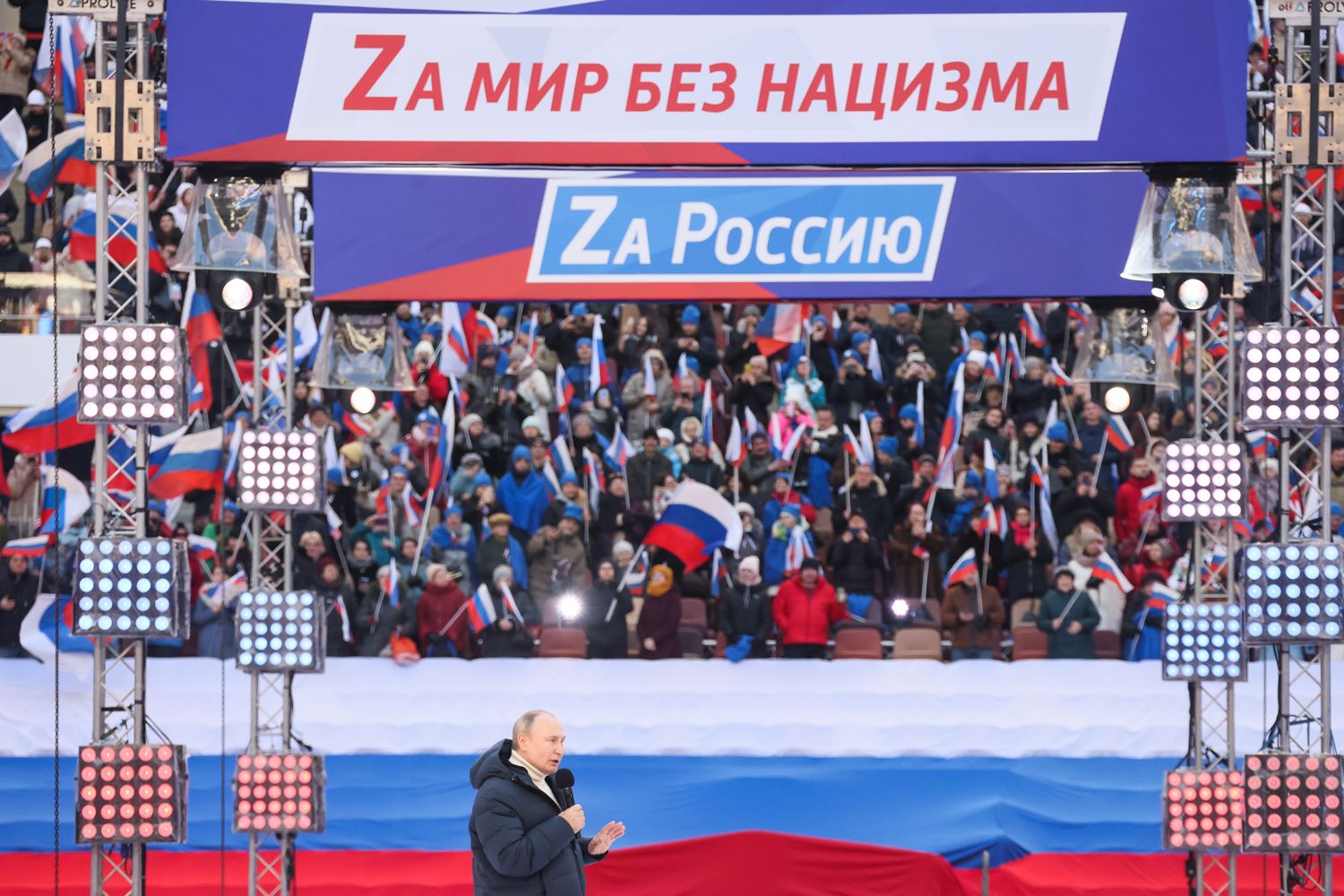When propaganda ‘goes overboard’
Kremlin officials fear a negotiated peace with Ukraine would destroy Putin’s ratings, Meduza’s sources say

Moscow has been waging an all-out war against Ukraine for eight weeks. Having retreated from the region around the capital, Kyiv, Russian troops are now refocusing their efforts on the battle for the Donbas. According to official statements, Russian forces are now seeking to “establish full control” over eastern and southern Ukraine. Meanwhile, Russian officials are keeping up their bellicose rhetoric and leveling constant threats against the West. Meduza special correspondent Andrey Pertsev breaks down the mood inside the Kremlin as Russia’s invasion of Ukraine enters its third month.
The Putin administration’s domestic policy bloc has come to a conclusion: there are currently no “good PR scenarios” for ending Russia’s war against Ukraine that would also preserve the authorities’ ratings. This is what three sources close to Putin’s administration told Meduza.
Putin’s domestic policy team began developing these “exit strategies” several weeks ago. “They looked, fiddled around, [but] there’s no clear scenario in sight. As such, they decided not to prepare [public] opinion for possible negotiations [and reaching a peace agreement]. They’re letting everything take its course,” explained one of Meduza’s sources.
Meduza’s sources claim that officials in the Kremlin are convinced that the majority of Russians perceive the war as a “struggle against Nazis and Nazism.” As proof, they refer to the results of classified sociological studies (which the Russian authorities have long used to monitor public opinion). As Meduza reported previously, since early March 2022, after Russia launched its full-scale invasion of Ukraine, contractors working for Putin’s administration have been conducting both quantitative and qualitative public opinion research, including interviews and focus groups.
That said, there is no reliable, independent data to corroborate these claims about the country’s “militant majority.” Various sociological surveys on Russians’ attitudes towards the war have been published, and many of them show overwhelming support for the “special military operation” in Ukraine. However, many experts stress that given the influence of propaganda, censorship, and repressions, these studies are unlikely to reflect reality.
Nevertheless, Putin’s administration continues to rely on its own survey data, which, according to Meduza’s sources, supports the notion that the Russian population is on the warpath. In particular, Kremlin officials are of the opinion that one of the most serious obstacles to “the public’s exit from the war” could be the “stance of many members of the middle class,” who allegedly support the “special operation.” Citing the same classified studies, Meduza’s sources claim that these “members of the middle class” believe that “if the war has already started, you need to keep going until victory — to Kyiv or even to Lviv. You can’t retreat.”
“As yet, these people [the middle class] have their savings as a cushion,” one source explained. “[Their] incomes allow them to practically ignore the rise in food prices. At the same time, they feel that they’re standing up for their country, for justice.”
These claims are implicitly supported by the results of a survey of thousands of Moscow residents conducted by the public opinion and market research company Russian Field (the survey was commissioned by Russian opposition politician Roman Yuneman). Indeed, among people whose incomes allow them to buy “almost anything,” 62 percent supported the continuation of the “special military operation in Ukraine” and just 29 percent supported peace talks. Among those whose incomes allow them to make major purchases (like household appliances), these figures were 54 percent and 37 percent, respectively. At the same time, those who couldn’t even afford groceries were almost evenly split, with 40 percent supporting the “special operation” and 40 percent favoring negotiations.
Speaking to Meduza, sociologist Grigory Yudin underscored that these results can be chalked up to the fact that “a significant portion of the Russian middle class consists of law enforcement and mid-level government officials.” “In other words, they are direct beneficiaries of the regime. Or they are those who know when they need to show loyalty,” he explained.
Imagined backlash
In this context, according to Meduza’s sources, the Kremlin “fears possible discontent” over pulling back troops and conducting peace talks. Allegedly, the authorities believe the backlash could even spill over into street protests.
Meduza’s sources attributed this notion to the fact that Russian propaganda has “gone overboard with whipping up the topic of Nazism” in Ukraine. “These triggers are too strong, it’s a revival of the memory of the Great Patriotic [War], when we fought against the Nazis. This memory has been cherished for far too long,” a source said, referring to the memory of World War II.
At the same time, officials in Putin’s administration publicly support this rhetoric, since they believe that it’s “too late to argue” with public opinion — and that, in any case, the fight has to continue until there’s some sort of result that can be framed as a “victory.” For example, during a recent event for school children at Moscow’s Museum of the Great Patriotic War, Putin’s domestic policy czar Sergey Kiriyenko said the following: “Russia, the Soviet Union, already fulfilled this historical mission of our people, we have already ensured victory over Nazism once, and our people, our country, will definitely do everything to ensure that Nazism can never raise it head again, not only here in Russia, but anywhere in the world.”
That said, two political strategists who spoke to Meduza (one who has worked with Putin’s administration in the past, and another who still works with Kremlin officials) questioned the validity of these fears. “Relying on some kind of sociology right now is strange. People are rather passive, they may not be against the war, but they aren’t for it either. You don’t see the letter ‘Z’ on middle-class cars in Moscow. [Survey] respondents are speaking reflexively — perhaps they aren’t even being dishonest. But this isn’t militant support. These people aren’t prepared to go fight themselves,” one political strategist commented.

Both sources are confident that if the authorities were to “tone-down the propaganda,” they shouldn’t expect any backlash from the “supporters” of the war. As one of them put it, “citizens will stop thinking and talking about Nazis, [and] completely switch to their own personal problems.”
Sociologist Grigory Yudin supported this line of thinking. The way he sees it, the authorities’ fears about stirring up opposition among the supporters of the “party of war” are a result of Kremlin illusions. In particular, Yudin recalled an article Meduza published a month before Russia’s full-scale invasion of Ukraine, in which a source close to Putin’s administration asserted that even Russian “hipsters” are “Imperial at heart.” “This, of course, is a sick fantasy,” Yudin said. “I don’t know any evidence of this. These people [in the Kremlin] invented an audience for themselves and are forcing everyone to play along with their lies. Albeit unsuccessfully.”
Story by Andrey Pertsev
Translation by Eilish Hart